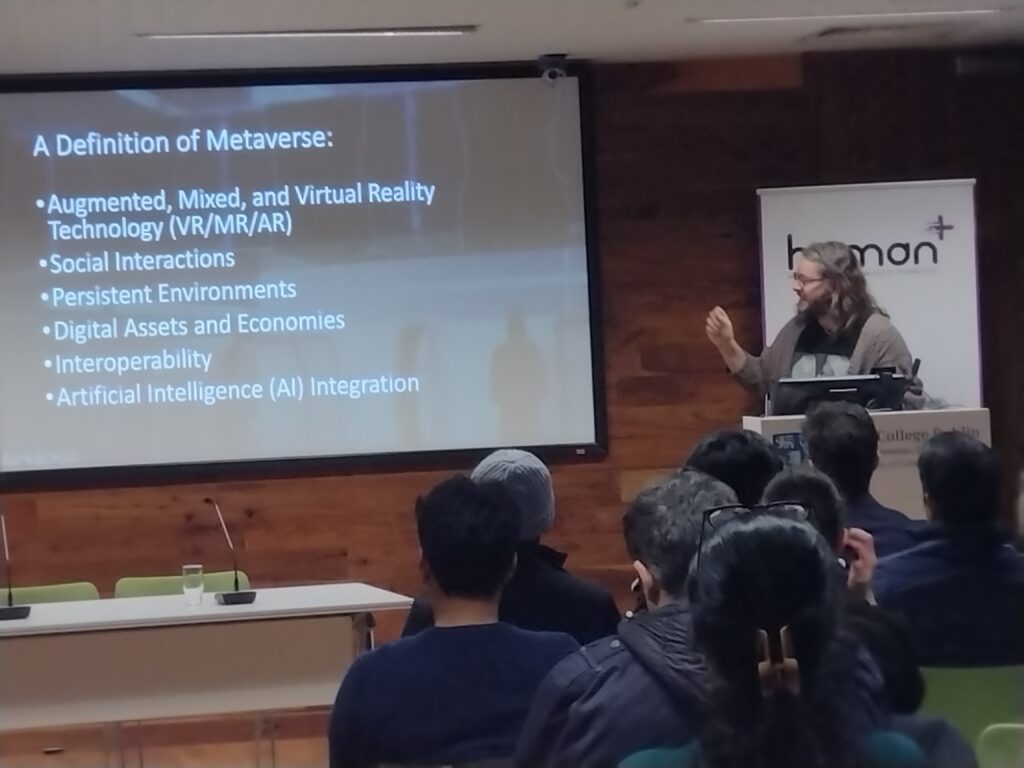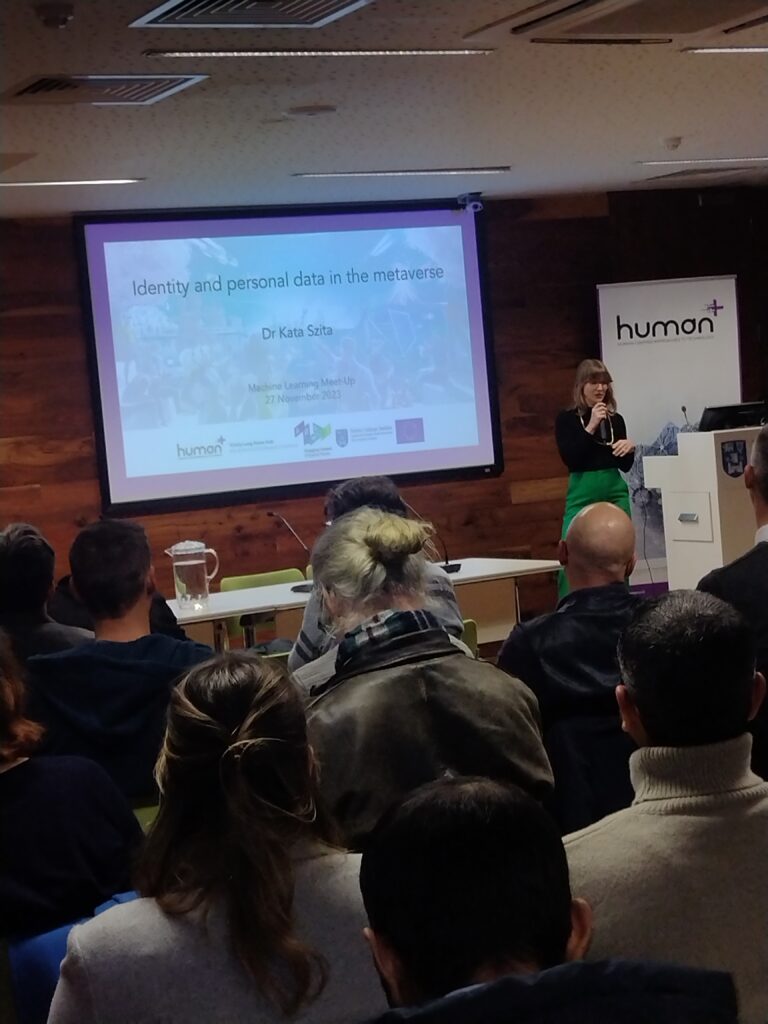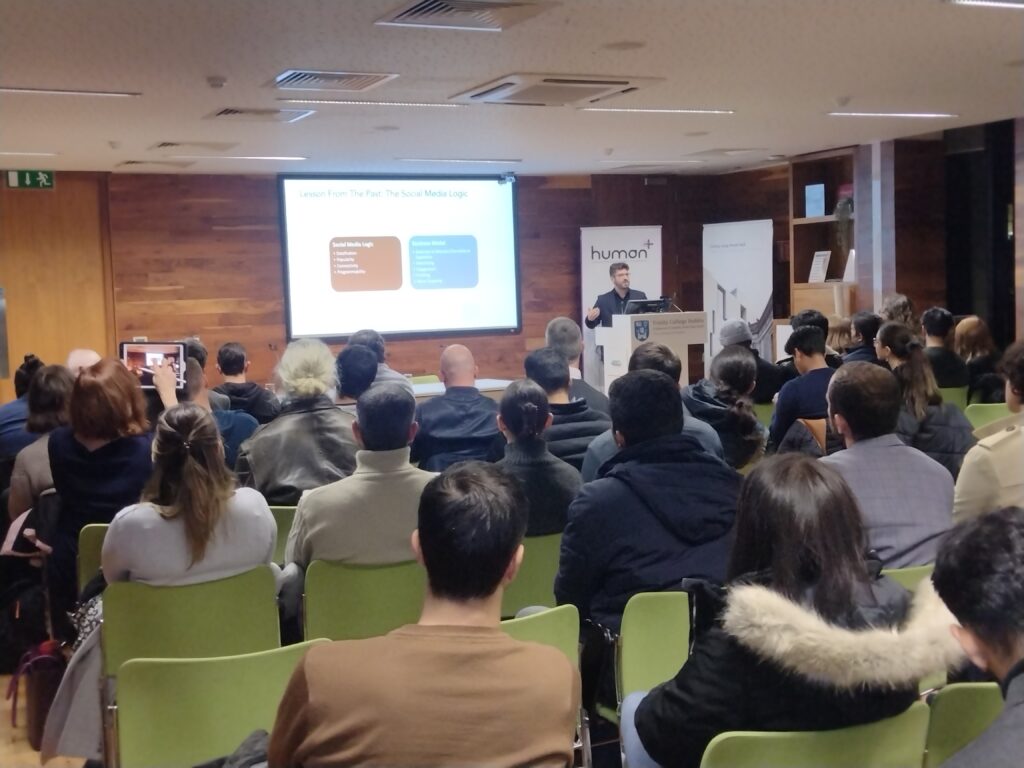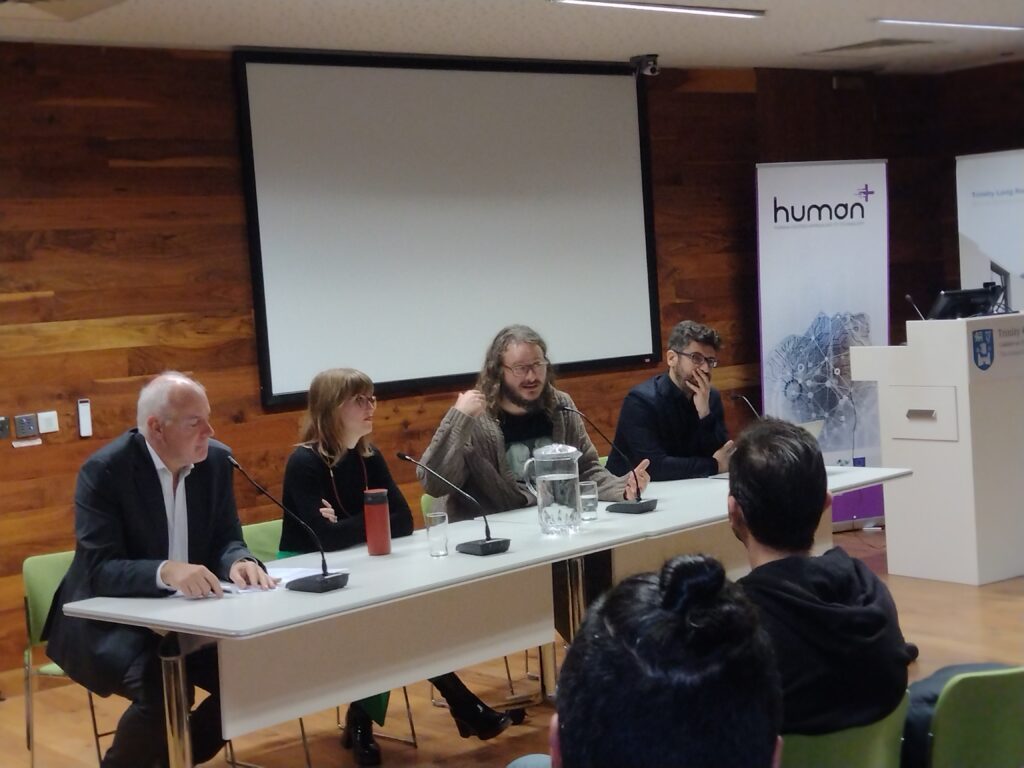Monday the 27th of November was a significant day for Human+ as its members presented the draft of their white paper to the Dublin Machine Learning Meetup organised by ADAPT, the Science Foundation Ireland Centre for Digital Content Innovation, in an event hosted by the Trinity Long Room Hub Arts & Humanities Research Institute. The paper, entitled “Considerations on Human Identity within the Metaverse Environment,” investigates issues of privacy and safety, access, inclusion and regulation in the future of online Virtual Reality (VR) & Extended Reality (XR) environments.
Professor Vincent Wade from Trinity’s School of Computer Sciences and Statistics is one of the programme directors leading the Human+ Programme. He welcomed the attendees, professionals and students who come together each month to listen to experts in machine learning, to the Trinity Long Room Hub. Wade highlighted the Human+ aim of centring the human in new technology. He described the Metaverse as “the next generation technology that AI is going to have a massive impact on,” and noted that the talks would focus on “what we can do to anticipate the problems, so we can get ahead of them. In other words, what are the considerations for human identity in the metaverse?”

The first speaker was Professor Gareth Young, a frequent collaborator with Human+ and assistant professor in the School of Computer Science and Statistics. He leads research at the intersection of extended reality (XR) technology, human-computer interaction (HCI), and artistic practice. His talk focused on ethical, creative exploration in the Metaverse, which requires collaboration with the Arts and Humanities. He described the Metaverse as “a dynamic canvass of creativity,” one that offers us many opportunities to go beyond simply replicating aspects of the world around us.
Computer scientists are reshaping the way we work, and this must take into account human characteristics such as imagination and self-expression. Noting the boom in virtual content creation we have seen with AI, Young explained that “we’re moving towards the brain/computer interface of science fiction,” and that we should be both critical of its problems, and embrace the opportunities, it affords us. This requires being conscious of the ethically ambiguous areas of the metaverse and having more conversations between academia, industry and the public in order to “take the best parts of the world and make it a better place.”
Following this was a presentation by Dr Kata Szita, a recent Human+ alumna and cognitive science researcher at Insight Centre and the School of Computer Science, UCD specialising in extended reality technologies. She addressed the opportunities and challenges that the metaverse offers its users, how identity in multi-user environments connects to the key issues of human behaviour and personal data. She discussed how the design of digital avatars can be used to empower the user to represent themselves, as “self-identity is in the metaverse is based on customisation and body awareness,” while also cautioning against in-group mentality which can lead to familiar social problems such as harassment, toxic behaviour, profiling, discrimination, and negative body image.
Szita discussed how privacy and data are evolving areas of risk, particularly in an age when AI generated profiles can be used to deceive users. It is important to talk about the human implications for the metaverse, she explained, because it is a social environment which covers human activity from education, through health and leisure, and all the way to dating. We therefore need a system that will “make the future of VR the most pleasant, the safest, and the most effective for users.”


Dr Nicola Palladino was the third speaker of the evening. Another recent alumnus of the Human+ research programme, his work in political science focuses on internet governance and digital policies. He presented on the current regulatory landscape and the challenges posed by the metaverse by extrapolating from research conducted on traditional social media platforms. Discussing key concerns, such as privacy and surveillance, he highlighted that manipulation on digital platforms was the biggest challenge, as “social media has demonstrated how popularity metrics have a detrimental affect on one’s sense of digital self-perception or representation.” This can lead to a “totalitarian nightmare,” in which users are influenced by propaganda for social or political ends.
In order to combat these dangers, Palladino shared details of several pieces of existing and planned European legislation which, if transposed to the metaverse, could ensure individuals gain the ability to control their own identity, including ownership of their own data and freedom of expression. Concluding, he stressed that “these rules, standards, and technical specifications are something we’re still working on. We don’t have the instruments yet to implement these regulations.” As with his colleagues, he was vocal on the importance of balancing trust in the Metaverse with caution.

The event was interspersed with questions from the audience, which led to lively discussions on AI and academia, technology and disability access, commercial ownership of the metaverse, and safeguarding issues for school-age demographics. Professor Wade ended the meetup by reminding the audience that the key to the metaverse’s success is “respecting the user,” in relation to legislation, user control and capabilities.
Machine Learning Dublin is a meetup group open to professionals and students interested in Machine Learning in any of its forms. There are presentations by selected guest speakers on different topics, and networking.
If you are interested in speaking or sponsoring this event, please contact [email protected]
Human+ is a five-year international, inter- and transdisciplinary fellowship programme conducting groundbreaking research addressing human-centric approaches to technology development. Human+ is led by the Trinity Long Room Hub Arts and Humanities Research Institute and ADAPT, the Science Foundation Ireland Centre for Digital Content Innovation, at Trinity College Dublin. The programme is further supported by unique relationships with HUMAN+ Enterprise Partners.
The HUMAN+ project has received funding from the European Union’s Horizon 2020 research and innovation programme under the Marie Skłodowska-Curie grant agreement No 945447.